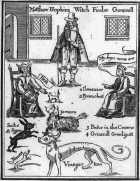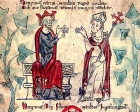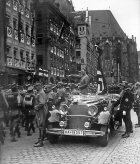Interpretations
The fact that both the National Curriculum in England and the national assessment objectives that frame public examinations at GCSE and A-level include a focus on ‘historical interpretations’ (plural) as well as referring separately to students’ own use of evidence – makes it very clear that there is an important distinction between the disciplinary concepts of ‘evidence’ and ‘interpretations’. While the former is concerned with students’ use of sources to develop their own interpretation of events; the latter is concerned with students’ exploration and explanation of how and why interpretations developed by historians differ from one another. (Both have a critical role to plan in students’ historical learning – and both need to be carefully planned!) Giving students the confidence and the knowledge to handle competing interpretations is undoubtedly challenging, but the materials in this section show how careful planning within and across the key stages (including Key Stage 3) can help students of all ages to engage effectively with interpretations examining the relationship between historians’ accounts (in books and on television) and the particular questions that they have chosen to answer, as well as the sources on which they claim to have drawn. Read more
-

Absence and myopia in A-level coursework
ArticleClick to view -

From flight paths to spiders’ webs: developing a progression model for Key Stage 3
ArticleClick to view -

Myths and Monty Python: using the witch-hunts to introduce students to significance
ArticleClick to view -

Reading? What reading?
ArticleClick to view -

Polychronicon 170: The Becket Dispute
ArticleClick to view -

‘This extract is no good, Miss!’
ArticleClick to view -

Right up my street: the knowledge needed to plan a local history enquiry
ArticleClick to view -

Narrating “Histories of Spain”
ArticleClick to view -

From ‘double vision’ to panorama: exploring interpretations of Nazi popularity
ArticleClick to view -

Polychronicon 167: The strange career of Richard Nixon
ArticleClick to view -

‘If you had told me before that these students were Russians, I would not have believed it’
ArticleClick to view -

Polychronicon 166: The ‘new’ historiography of the Cold War
ArticleClick to view -

Putting Catlin in his place?
ArticleClick to view -

Polychronicon 165: The 1917 revolutions in 2017: 100 years on
ArticleClick to view -

Cunning Plan 165: Helping lower-attaining students
ArticleClick to view -

Triumphs Show 164: interpretations at A Level
ArticleClick to view -

Polychronicon 163: Europe: the longest debate
ArticleClick to view -

Year 8 and interpretations of the First World War
ArticleClick to view -

Polychronicon 162: Reinterpreting the May 1968 events in France
ArticleClick to view -

Polychronicon 161: John Lilburne
ArticleClick to view

